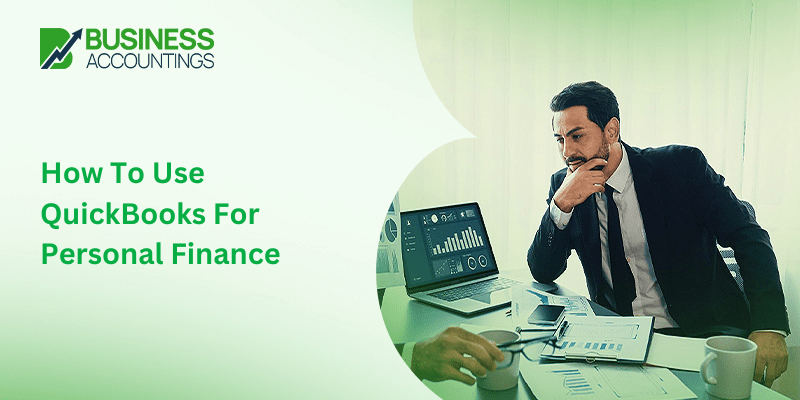People usually struggle to manage their finances in today’s time. As we all know managing personal finances effectively is important to achieving financial stability and reaching long-term financial goals. QuickBooks, widely used by businesses all around the world for its robust accounting features, can also be used effectively for personal finance management. In this article, we’ll explore how you can use QuickBooks for personal finance management and take control of your financial lives.
What is QuickBooks?
QuickBooks is a widely used accounting software developed by Intuit, known for its advanced features tailored for businesses of all sizes. However, other than its application in corporate, QuickBooks also offers tools and functionalities that one can use to manage personal finances effectively. From income and expense tracking to budgeting and reporting, QuickBooks for personal finance is a holistic solution for finance management.
Why Use QuickBooks for Your Personal Finance?
Imagine having all your financial data neatly organized in one place, with just a few clicks. That’s what QuickBooks can do for you! Here’s why you should consider using QuickBooks for personal finance:
- Track Income & Expenses: QuickBooks collects data from all your accounts, so you can have a unified view of everything so that you exactly know where your money is coming from and where it’s going.
- Automate Bills: With Quickbooks, you need not do tedious data entries on your own. QuickBooks connects to your bank accounts and credit cards to import transactions automatically, it saves you time and reduces errors.
- Easy Budgeting: With QuickBooks, you can easily set up budgets for different spending categories, which can help you stay on track with finances and avoid overspending.
- Create Reports: QuickBooks helps you to see how much you’ve spent on groceries this month or how much savings you have. QuickBooks easily generates reports that give you all the details you need about all your expenses and savings, without any hassle.
- Manage Multiple Accounts: QuickBooks syncs with your bank and other financial apps, making it easy to manage everything in one place.
Step-By-Step Guide for Using QuickBooks for Personal Finance:
Step 1. Setting Up QuickBooks for Personal Use:
Choose the Right QuickBooks Version: QuickBooks offers different versions suitable for different needs. For personal finance management, QuickBooks Online or QuickBooks Desktop (Pro, Premier, or Mac) are the most suitable options.
Account Setup: Start with creating a new QuickBooks account for your personal finance. Add your personal bank account details, credit card information, and other relevant financial accounts.
Step 2. Track Income and Expenses:
Link Bank Accounts: You need to connect your personal bank accounts to QuickBooks to automatically import transactions. By doing so you can ensure accurate tracking of income streams and expenses.
Categorize Transactions: Create custom income and expense categories to classify transactions accurately. This helps you to understand how much money you are spending and to set limits by knowing to avoid overspending and identifying areas for potential savings.
Regular Reconciliation: Reconcile bank statements with QuickBooks records regularly for better accuracy and to detect any discrepancies.
Also, Read -> Fix QuickBooks Error Code 9000
Step 3. Budgeting and Financial Planning:
Establish Budgets: Set up budget limits for yourself for different expenses such as groceries, utilities, entertainment, etc. QuickBooks allows you to track actual spending against the budget amounts that you have set, helping you to manage your budget effectively.
Set Goal: Define your financial goals such as saving for a vacation, want to buy a home, or building an emergency fund. You can use QuickBooks to monitor progress towards achieving these goals and make necessary adjustments to achieve them.
Step 4. Managing Bills and Payments:
Bill Tracking: You can add recurring bills and expenses into QuickBooks to track due dates and amounts owed. You can also set up reminders to make sure payments are done timely and avoid late fees.
Online Payments: You can use the QuickBooks online payment feature to manage bill payments. Also, easily schedule payments directly through QuickBooks to make the payment process easy.
Reporting and Analysis:
Generate Reports: You can easily generate reports such as income vs. expenses, net worth, cash flow, etc., to assess financial health and make informed decisions about your finances. Use the QuickBooks reporting feature to get insights into what is your financial situation for better finances.
Customization: Tailor reports to match your specific needs by adjusting parameters and selecting relevant data points. QuickBooks offers the flexibility to customize reports as per your needs and goals to provide meaningful insights.
Security and Data Protection:
Data Security: You can enable multi-factor authentication, use strong passwords, and regularly update QuickBooks software to protect against potential threats.
Backup Data: Regularly back up QuickBooks data to prevent any data loss if any situation of system failures or data breaches arise. Store backups securely in external drives or cloud storage platforms for added protection.
QuickBooks isn’t just for businesses; it’s a powerful tool for managing personal finances effectively. By using its advanced features for income and expense tracking, budgeting, bill management, reporting, and security, you can gain control over your financial lives and can easily achieve your financial goals. With careful setup and consistent use, QuickBooks can be a valuable companion on your journey toward financial wellness and prosperity.
